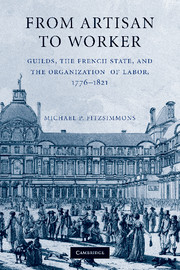3 - The Reemergence of Guilds as a Policy Issue, 1800–1811
Published online by Cambridge University Press: 06 July 2010
Summary
It was a first step toward the reestablishment of guilds; one could, however, justify this decision for valid regulatory reasons.
Antoine-Claire Thibaudeau, Mémoires sur le Consulat, on the reorganization of butchers in Paris in 1802If there was a moment during the Revolutionary and Napoleonic epoch when guilds might have been restored, it was during the reign of Napoleon Bonaparte. To the degree that it sought to reconcile royalists and republicans, for example, the Consulate was nonideological. At the same time, it had definite objectives, and it clearly valued order over freedom.
The Council of State debated the restoration of guilds during the early period of the Consulate, and apparently recommended their reestablishment, but this did not occur. Moreover, many disparate efforts, both governmental and nongovernmental, to reorganize guilds, individually and comprehensively, continued for a decade.
THE CONSULATE AND THE REEMERGENCE OF THE ISSUE OF GUILDS
The coup that toppled the Directory in November 1799 and ultimately brought Napoleon Bonaparte to power was undertaken by members of the political elite to deal with a major political crisis that included stalemates in domestic and foreign relations, an unwillingness to accept political change and a weak executive authority. In the final analysis, however, although it has occasionally been overstated, much of the Directory's failure was economic. The general reaction to the coup was apathy, due in large measure to the parlous state of the economy.
- Type
- Chapter
- Information
- From Artisan to WorkerGuilds, the French State, and the Organization of Labor, 1776–1821, pp. 121 - 188Publisher: Cambridge University PressPrint publication year: 2010

